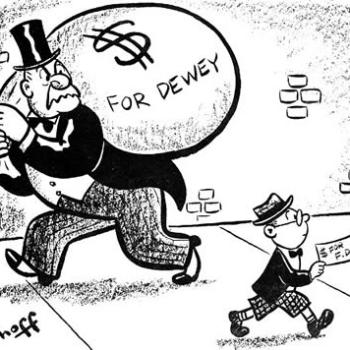“You just call out my name,” James Taylor sings, “and you know where ever I am / I’ll come running …”
You’ve likely said something similar to someone at some point. “If you ever need me, I’ll be there for you.” That, as Taylor says, is the mark of a friend.
But is it really? Because if that’s what it means to tell someone “You’ve got a friend,” then this is something that none of us can ever say to more than one person. If this is what it means to be a friend, then each of us can have one — and only one — friend.
We can make such a promise and mean it and keep it if we only make it to one person. But we cannot hope to keep such a promise if we make it to more than one person. What if they both “call out my name” at the same time? Or what if “wherever I am” turns out to be by the side of Friend A when Friend B suddenly needs me? If I “come running” to see Friend B, then I break my promise to Friend A. If I stay with Friend A, then I break my promise to Friend B.
What do I do if both friends need me at the same time?
Well, you’re probably thinking, that depends. It depends on the situation — on which friend needs you more right then.
That’s a reasonable solution. In fact, that’s precisely the reasonable solution that nearly everyone lives by — the reasonable solution that allows us to have more than one friend apiece.
Yet while this eminently reasonable solution is nearly universally embraced, it’s also widely condemned. And it’s particularly condemned — with great gusto — in my own religious community of American evangelical Christianity. Because “it depends on the situation” is the very definition of what many American evangelicals denounce as “moral relativism.”
Go ahead and do a Google search on that phrase, or on, say, “moral relativism + apologetics,” and you’ll find no shortage of vigorous denunciations. “Moral relativism,” these screeds and sermons say, is the root of all that’s wrong with the world. It leads to gay marriage, universal health care, progressive taxation, sex, drugs and rock ‘n’ roll. It’s why Americans have abandoned God and the gold standard. It’s why kids these days won’t keep off my lawn.
“Moral relativism,” this argument says, erodes belief in moral absolutes, and absolute morality is absolutely necessary.
The problem there, of course, is that such moral absolutes are like James Taylor’s absolute friendship. It works fine if you’ve only got the one friend, but if you’ve got more than that, and if two or more of them require your attention at the same time …
What happens when two or more moral absolutes clash? What do you do?
Well, again, that depends on the situation. But what if you’ve been strictly taught that you must never say “that depends on the situation”? That escalates the dilemma — pushing it from a thorny question to a full-blown crisis of faith. And for those who have been taught to denounce “moral relativism,” such crises are inevitable, insoluble and insurmountable.
I think it’s wrong to put people into that situation — to set them up for such unnecessary and cruel crises. That’s tying up heavy burdens, hard to bear, and laying them on the shoulders of others, while being unwilling to lift a finger to help them. And that’s just wrong.
I’d say it’s absolutely wrong, except that, well, you know.
















